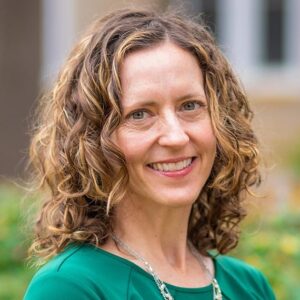
Food that Tastes Like Justice: Growing Students through Gardening
Lutheran Theological Southern Seminary (LTSS) of Lenoir-Rhyne University in Columbia, SC sits in an African American neighborhood impacted by policies of food apartheid. For several years the faculty has listened for our vocation, hoping to create a seedbed for fresh food and racial repair in our community. As a part of this discernment, my colleague, Rev. Dr. Ginger Barfield, Onnie Jackson, a board member of the asset-based development nonprofit Koinonia of Columbia, and I attended a training by the nonprofit, Life Around the Table, on their curricular framework called Eating Together Faithfully (ETF). While at the training and on a hike, the words “grow my garden” came to me. As I shared this experience with my LTSS team, we wondered what it might mean, and if the Holy Spirit might be up to something among us.
Those enigmatic words stayed with me as we (Ginger, Onnie, and I) started a pilot group using the ETF framework in March 2020. Twelve community members gathered around the table—seminary professors, students, leaders of Koinonia of Columbia, the principal of the Title 1 elementary school across the street, and leaders in Axiom Farms, an organization dedicated to teaching and practicing sustainable agriculture. Keith Alexander, the founder and leader of Axiom and a third-generation farmer in South Carolina, shared his profound knowledge of the injustices of the food economy and his proactive work to farm differently. A tall man with a soft-spoken manner, Keith Alexander described his sharecropper grandfather and his decades-long vision to “grow food that tastes like justice” by cultivating a food hub in our neighborhood. My eyes opened and my head jerked up from the table. “This is the garden God wants to grow,” I thought. “Food that tastes like justice—on the ten-acre campus of an historically white institution that is currently only growing a monoculture of grass.”
During the pandemic 2020-2021 school year the campus’s land lay fallow, but we cultivated relationships in our local food economy. I taught ETF to our students online, and Axiom Farms, Koinonia of Columbia, the Columbia Food Policy Committee chairperson, and other community members involved in food justice work came into our Zoom squares. The students, by engaging in conversation with farmers and food activists and by preparing a meal from local produce each week, learned how to eat justly. Meanwhile, the seminary, through the leadership of our dean, Mary Hinkle Shore, applied for and was approved for grants from the In Trust Center for Theological Schools and the North Carolina Synod of the Evangelical Lutheran Church in America to grow a garden on our campus. Dean Shore and I, through conversations with the leadership of the Methodist Theological School in Ohio, learned about their exemplary work on their campus farm and their curricular integration of theologies of ecotheology, sustainability, and justice.
By fall 2021, Keith Alexander and his Axiom Farms team began plans for a sustainable garden and became the food service vendor of our campus—with the vision to become a farm-to-table restaurant for the community. Alexander said, “We’ve entered a partnership with Lenoir-Rhyne to bring a food hub and farm to campus. We already have a relationship with the community. People in the community are excited for us to open and have access to fresh food.” Alexander and his team plan to offer agriculture classes to the community and to eventually offer produce boxes from the campus garden.
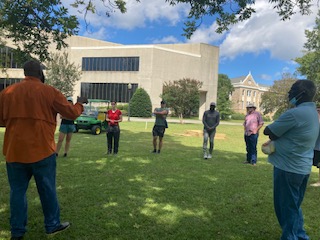 In September 2021, as a part of learning about creation care, my Christian Ethics class met at the new garden site with Keith Alexander. As we stood in a circle, he described his quarter of an acre plot design with the use of grow bags, which offer maximum yield and minimal labor using high-quality soil and without the need for weeding. Students shoveled rich, loamy black soil into the grow bags. Other students placed cardboard on the ground as a weed preventative.
In September 2021, as a part of learning about creation care, my Christian Ethics class met at the new garden site with Keith Alexander. As we stood in a circle, he described his quarter of an acre plot design with the use of grow bags, which offer maximum yield and minimal labor using high-quality soil and without the need for weeding. Students shoveled rich, loamy black soil into the grow bags. Other students placed cardboard on the ground as a weed preventative. 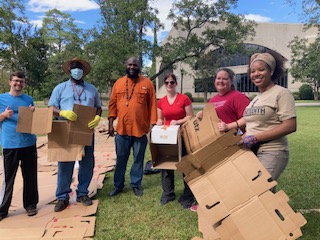 Later in the semester, Alexander came into the classroom to converse with students on the differences between organic and industrial farming, racism in farming, and to reflect on practices of sustainable agriculture. A student who had taken the ETF class and Christian Ethics said, “It’s amazing to see this garden dream taking place, and to have gotten my hands dirty in the soil of it.”
Later in the semester, Alexander came into the classroom to converse with students on the differences between organic and industrial farming, racism in farming, and to reflect on practices of sustainable agriculture. A student who had taken the ETF class and Christian Ethics said, “It’s amazing to see this garden dream taking place, and to have gotten my hands dirty in the soil of it.”
Students are learning anti-racist discipleship and community partnership by getting their hands in soil and by listening to wise teachers like Alexander. In a service, we dedicated the garden and by winter 2022 our campus and community will begin to eat collards and kale from the grow bags. Those three words “grow my garden” have taken root on our campus grounds, in our seminary, and among community members. The Holy Spirit is indeed up to something, and it’s going to taste like justice. 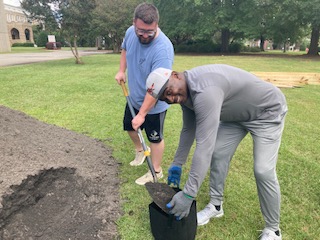
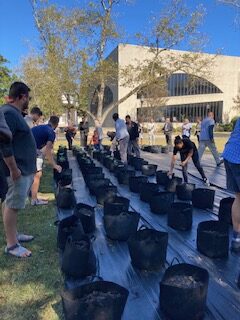
Greetings and blessings Dr. Dobson.
What an exceptional experience and shows justice in theory and praxis embodied.
thanks for sharing this beautiful honoring of creation and collaboration.
Keep up the good work. I’ve shared this article with a student working on sustainability and ecowomanism
and with another young farmer here in Raleigh, NC.